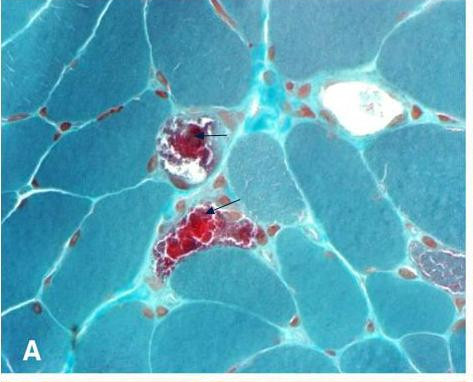MERRF syndrome, or Myoclonic Epilepsy with Ragged Red Fibers, is a rare mitochondrial disorder caused by mutations in mitochondrial DNA (mtDNA). It affects multiple systems in the body, particularly muscles and the nervous system.
Symptoms:
- Myoclonus: Sudden, involuntary muscle jerks.
- Epileptic Seizures: Various types of seizures, often difficult to control.
- Ataxia: Loss of coordination and balance.
- Muscle Weakness: Progressive muscle weakening.
- Ragged Red Fibers: Abnormal muscle fibers seen in muscle biopsy.
- Other Possible Symptoms:
- Hearing loss
- Exercise intolerance
- Short stature
- Cardiomyopathy (heart muscle disease)
- Dementia
- Peripheral neuropathy (nerve damage in the limbs)
- Optic atrophy (damage to the optic nerve)
Causes:
MERRF syndrome is caused by mutations in mitochondrial DNA, most commonly the A8344G mutation in the MT-TK gene. Mitochondria, the energy-producing structures in cells, have their own DNA, which is inherited maternally. Mutations in this DNA disrupt the normal function of mitochondria, leading to energy production problems and subsequent symptoms.
Treatment:
There is no cure for MERRF syndrome. Treatment focuses on managing symptoms and improving quality of life:
- Antiepileptic Drugs (AEDs): To control seizures.
- Physical Therapy: To manage muscle weakness and ataxia.
- Speech Therapy: For speech difficulties.
- Hearing Aids: For hearing loss.
- Coenzyme Q10 and L-Carnitine Supplements: Sometimes used to support mitochondrial function, though their efficacy is uncertain.
- Symptomatic Treatment: For specific symptoms like cardiomyopathy or neuropathy.
Prevention:
There is no way to prevent MERRF syndrome since it is a genetic condition. However, genetic counseling can help families understand the risks of passing on mitochondrial disorders. Prenatal testing and preimplantation genetic diagnosis (PGD) might be options for some families.
Conclusion:
MERRF syndrome is a complex, multi-system disorder with significant variability in symptoms and severity. While there is no cure, various treatments can help manage symptoms and improve quality of life for those affected. Ongoing research aims to better understand mitochondrial diseases and develop more effective therapies.

































